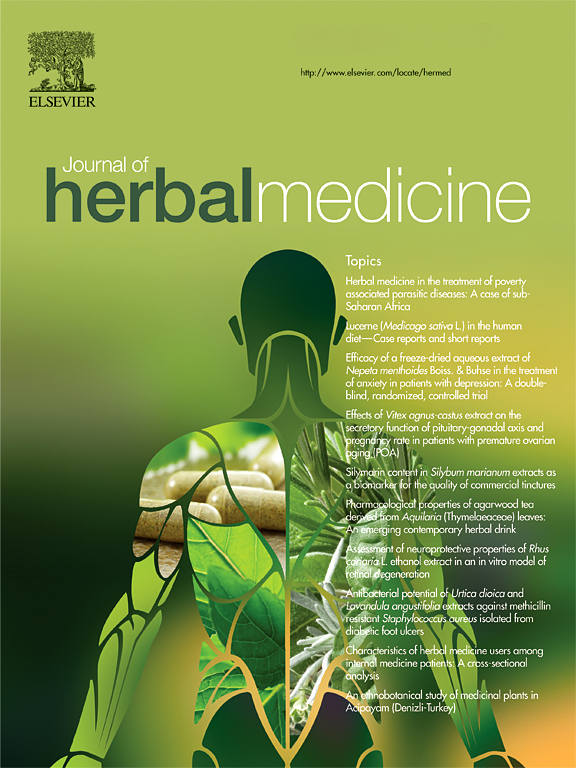Effects of topical herbal medicine on rosacea: a systematic review and meta-analysis
IF 1.9
4区 医学
Q2 INTEGRATIVE & COMPLEMENTARY MEDICINE
引用次数: 0
Abstract
Introduction
Rosacea is a chronic inflammatory skin condition characterised by facial erythema, papules, pustules, and telangiectasia. Traditional treatments often associated with adverse effects and high recurrence rates. This review evaluates the effectiveness and safety of topical herbal medicines for rosacea.
Methods
We conducted a systematic review of randomised controlled trials (RCTs) from various databases, including PubMed, Embase, MEDLINE, Cochrane Library, Chinese Electronic Periodical Services (CEPS), China National Knowledge Infrastructure (CNKI), and http://ClinicalTrials.gov databases from the inception of the source to September 1, 2024. Studies were selected based on inclusion and exclusion criteria, and data regarding study characteristics, interventions, outcomes, and adverse events were extracted. The risk of bias was assessed using the Cochrane risk of bias tool. Moreover, statistical analyses were performed using Review Manager software. The protocol was registered on PROSPERO under the registration number CRD42022383985.
Results
In total, 10 RCTs involving 833 participants were included. The meta-analysis revealed that topical herbal medicines exhibited significantly greater efficacy in treating skin lesions (RR = 1.21; 95% CI = 1.09–1.34) and resulted in a significantly improved Investigator Global Assessment of Rosacea Severity Score (IGA-RSS) (MD = −0.40; 95% CI = −0.50 to −0.30) than control treatments. Adverse events were reported in eight studies; however, no significant difference was noted between the intervention and control groups. Sensitivity analysis reduced heterogeneity, further confirming these findings.
Conclusions
Topical herbal medicines appear to be effective and safe for treating rosacea; they also exhibit fewer adverse effects than conventional treatments.
局部草药对酒渣鼻的影响:系统回顾和荟萃分析
酒渣鼻是一种慢性炎症性皮肤病,以面部红斑、丘疹、脓疱和毛细血管扩张为特征。传统的治疗方法往往伴随着不良反应和高复发率。本综述评价了局部草药治疗酒渣鼻的有效性和安全性。方法我们对来自PubMed、Embase、MEDLINE、Cochrane图书馆、中国电子期刊服务中心(CEPS)、中国知网(CNKI)和http://ClinicalTrials.gov等数据库的随机对照试验(RCTs)进行系统评价,时间从文献开始至2024年9月1日。根据纳入和排除标准选择研究,并提取有关研究特征、干预措施、结果和不良事件的数据。使用Cochrane偏倚风险工具评估偏倚风险。此外,使用Review Manager软件进行统计分析。该协议在PROSPERO上注册,注册号为CRD42022383985。结果共纳入10项随机对照试验,纳入受试者833人。荟萃分析显示,外用草药治疗皮肤病变的疗效显著提高(RR = 1.21;95% CI = 1.09-1.34),结果显著改善了研究者酒渣鼻严重程度评分(IGA-RSS) (MD = - 0.40;95% CI = - 0.50 ~ - 0.30)。8项研究报告了不良事件;然而,干预组和对照组之间没有显著差异。敏感性分析降低了异质性,进一步证实了这些发现。结论中药治疗酒渣鼻安全有效;与传统疗法相比,它们也表现出更少的副作用。
本文章由计算机程序翻译,如有差异,请以英文原文为准。
求助全文
约1分钟内获得全文
求助全文
来源期刊

Journal of Herbal Medicine
INTEGRATIVE & COMPLEMENTARY MEDICINE-
CiteScore
3.90
自引率
0.00%
发文量
94
期刊介绍:
The Journal of Herbal Medicine, the official journal of the National Institute of Medical Herbalists, is a peer reviewed journal which aims to serve its readers as an authoritative resource on the profession and practice of herbal medicine. The content areas of the journal reflect the interests of Medical Herbalists and other health professionals interested in the clinical and professional application of botanical medicines. The objective is to strengthen the research and educational base of herbal medicine with research papers in the form of case studies, original research articles and reviews, monographs, clinical trials and relevant in vitro studies. It also publishes policy statements, opinion pieces, book reviews, conference proceedings and profession related information such as pharmacovigilance reports providing an information source for not only the Herbal Practitioner but any Health professional with an interest in phytotherapy.
 求助内容:
求助内容: 应助结果提醒方式:
应助结果提醒方式:


